英语主谓一致的三个原则
主谓一致的三个原则
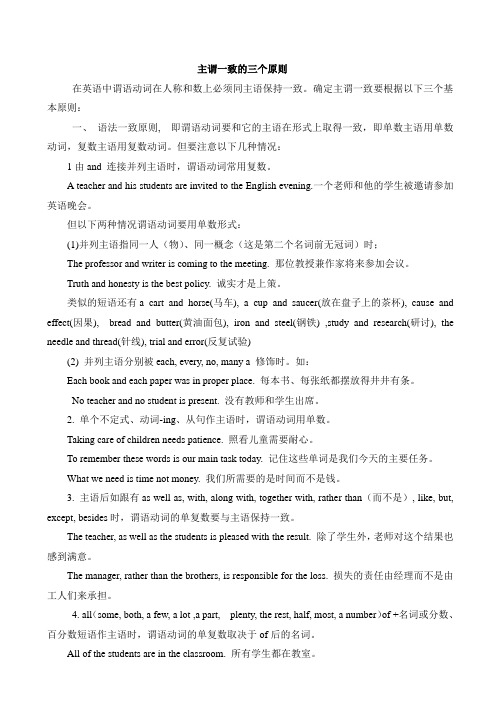
主谓一致的三个原则在英语中谓语动词在人称和数上必须同主语保持一致。
确定主谓一致要根据以下三个基本原则:一、语法一致原则, 即谓语动词要和它的主语在形式上取得一致,即单数主语用单数动词,复数主语用复数动词。
但要注意以下几种情况:1由and 连接并列主语时,谓语动词常用复数。
A teacher and his students are invited to the English evening.一个老师和他的学生被邀请参加英语晚会。
但以下两种情况谓语动词要用单数形式:(1)并列主语指同一人(物)、同一概念(这是第二个名词前无冠词)时;The professor and writer is coming to the meeting. 那位教授兼作家将来参加会议。
Truth and honesty is the best policy. 诚实才是上策。
类似的短语还有a cart and horse(马车), a cup and saucer(放在盘子上的茶杯), cause and effect(因果), bread and butter(黄油面包), iron and steel(钢铁) ,study and research(研讨), the needle and thread(针线), trial and error(反复试验)(2) 并列主语分别被each, every, no, many a 修饰时。
如:Each book and each paper was in proper place. 每本书、每张纸都摆放得井井有条。
No teacher and no student is present. 没有教师和学生出席。
2. 单个不定式、动词-ing、从句作主语时,谓语动词用单数。
Taking care of children needs patience. 照看儿童需要耐心。
To remember these words is our main task today. 记住这些单词是我们今天的主要任务。
主谓一致的基本原则
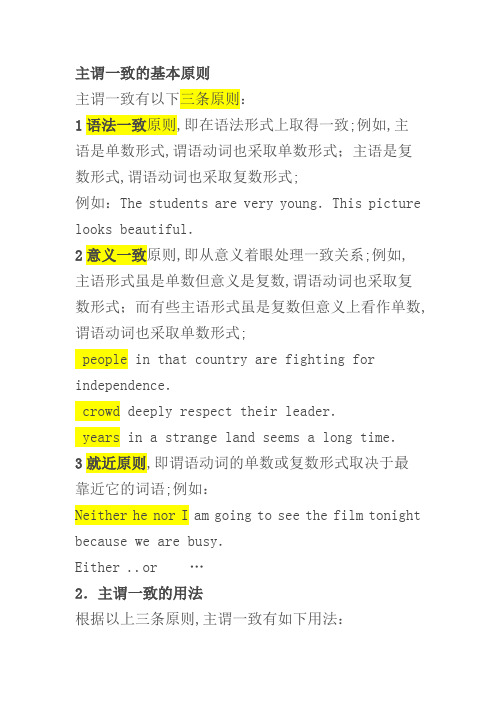
主谓一致的基本原则主谓一致有以下三条原则:1语法一致原则,即在语法形式上取得一致;例如,主语是单数形式,谓语动词也采取单数形式;主语是复数形式,谓语动词也采取复数形式;例如:The students are very young.This picture looks beautiful.2意义一致原则,即从意义着眼处理一致关系;例如,主语形式虽是单数但意义是复数,谓语动词也采取复数形式;而有些主语形式虽是复数但意义上看作单数,谓语动词也采取单数形式;people in that country are fighting for independence.crowd deeply respect their leader.years in a strange land seems a long time.3就近原则,即谓语动词的单数或复数形式取决于最靠近它的词语;例如:Neither he nor I am going to see the film tonight because we are busy.Either ..or …2.主谓一致的用法根据以上三条原则,主谓一致有如下用法:1下列结构作主语,谓语动词一般用单数形式a.表示时间、重量、长度、价值的名词作主语,谓语动词通常用单数形式;例如:hundred miles is a long distance.dollars is a high price for that book.b.由anyone,anything,anybody,noone,nothing,everyone,everybody,everything,some one,somebody,each,either,neither等不定代词作主语,谓语动词使用单数形式;例如:is knocking at the door.is better than going to the movie tonight.c.由“a series of,a kind of,a portion of +名词”作主语,谓语动词应用单数形式;例如:A series of debates is scheduled to be held next week.d.由“many a,more than one +单数名词”作主语,尽管意义上表示复数,但谓语动词仍采用单数形式;例如:Many a person in these circumstances has hoped for a long break.There is more than one answer to your question.e.“名词+and+名词”作主语,表示同一人、同一概念或事物时,谓语动词用单数形式;例如:A writer and educator is giving a lecture now.这个人既是作家又是教育家A writer and a educatorf."either neither + of +复数名词或代词"作主语,谓语动词用单数形式;例如:either of you takes a vacation now,we will not be able to finish the work.of them wants to come.g.在each…and each…,every…and every…等结构之后,谓语动词用单数形式;例如:Each man and each woman has the right to vote.h.动词不定式、动名词或分句作主语时,谓语动词一般用单数形式;例如:What I want to say is none of your business.Listening to the classical music is enjoyable.i.以-ics结尾的复数名词指一门学科时,如politics政治学,mathematics数学,statistics统计学,acoustics声学,linguistics语言学等,谓语动词用单数形式;例如:Mathematics is what he majors in.2下列结构作主语,谓语动词单复数形式取决于of后的名词;意义一致a.由“a11,none,no,most,half,the last,the rest,the remainder+of+名词”等不定代词作主语,谓语动词单复数形式由of后名词的单复数而定;例如:None of the food is wasted.None of the students were absent.The rest of the lecture was dull.The rest of the bikes were on sale yesterday.b.由"lots of,heaps of,loads Of,scads of +名词”作主语,谓语动词单复数形式由of后名词的单复数而定;例如:Lots of work is to be done this week.Lots of people are going to swim this afternoon.There is loads of milk on the farm.There are loads of big red apples on the ground.There is heaps of fun.c.由“分数或百分数十of +名词或代词”作主语,谓语动词的单复数形式取决于of后名词或代词的单复数形式;例如:Three-quarters of the area is cultivated.Ninety percent of the students have passed the exam.3下列结构作主语,谓语动词的单复数形式根据意义而定;a.由“the+形容词” 这种结构作主语,根据意义一致的原则决定谓语动词的单复数形式;如果表示一类人如the rich,the poor,the blind,the deaf,the sick,the young,the old,谓语动词用复数形式;如果表示个人或抽象概念,谓语动词用单数形式;例如:The blind are taught trades in special schools.表示一类人The good in him overweighs the bad.表示抽象概念The departed was a good friend of his.表示个人b.family,crowd,committee,class,audience,group ,government,team,public,majority,minority等集合名词作主语,谓语动词单复数形式应根据意义而定;例如:The family like to listen to the music.the family 指这家人,用作复数The family is small.the family指这个家庭,用作单数The committee has considered your proposal.the committee指委员会,用作单数The committee were arguing for an hour before they gave their votes. the committee指委员会的委员们,用作复数下列结构作主语,谓语动词一般单复数均可;a.以数词为名词词组中心词作主语时,谓语动词一般单复数均可;例如:Five and six make/makes eleven.Seven times ten are seventy.但是:Twenty from thirty leaves ten.Six sevens are forty-two.b.由"one in/out of +名词”作主语,谓语动词单复数均可;例如:One in ten were/was present.下列结构作主语,谓语动词用复数形式;由and或both…and连接两个单数形式的名词词组作主语时,一般谓语动词用复数形式;例如:A girl and a boy want to go.Both rice and wheat are grown in that country.6下列结构作主语,谓语动词单复数形式视具体情况而定;a.由as well as,together with,besides,like,along with,with but,except,accompanied by,rather than,including连接两个名词作主语,谓语单复数形式应由连接词前的名词而定;例如:The president of the college,together with the deans,is planning a conference for the purpose of laying down certain regulations.The young mother with her two children is coming now.The plant manager,like many technicians,is experienced in designing new products.b.“名词+of+名词”作主语,谓语动词单复数形式跟of前的名词一致;例如:The picture of the children孩子的照片 brings back many memories of my past experiences.The effects of cigarette smoking have been proved to be extremely harmful.c.由not only…butalso,either…or,neither…nor或or连接的并列主语,通常根据就近一致原则,谓语动词的单复数形式由最接近它的名词词组的单复数形式决定;例如:He or you have taken my pen.Neither the students nor the teacher knows anything about it.One or two days are enough to visit the city. d.there be句型中的谓语动词单复数形式一般取决于其后的真正主语的单复数形式;例如:There is a garden in front of the house.There are two things I'd like to say here.7关于几对容易混淆词组的一致用法a.由"this/that kind/type of +名词”作主语,谓语动词用单数形式;而由"these/those kind/type of +复数名词”作主语,谓语动词用复数形式;例如:kind of apples is highly priced.这种kinds of tests are good.那些b.由“a number of,a total of,an avera ge of +复数名词”作主语,谓语动词用复数形式;由“the number of,the total of,the average of +复数名词”作主语,谓语动词用单数形式;例如:A number of students are waiting for the bus.The number of the students in this university is increasing yearly.c.one of,the only one of的一致用法This is one of the books that have been recommended.This is the only one of the books that has been recommended.3.前后呼应的用法1当everyone,everybody,noone,nobody,anyone,anybody,someone,somebody,eve rything,anything,something,nothing等用作主语时,其相应的代词一般用单数形式;例如:If anybody calls,tell him that I'm out.Something strange happened,didn't itEvery passenger has to carry his own luggage.2人称代词与名词的呼应:人称代词I me,he him,she her,it it都是代替前面的单数名词,而they them,we us则是代替复数名词的,you既可以代表单数,也可以代表复数;但表示泛指的时候,用he或one来表示;例如:If a young person enters a classical music field only for money,he is in the wrong profession.The leaves of the red maple are highly poisonous to horses and when ingested can kill them within fifteen hours;3物主代词与名词的呼应:my,our,his,her,its,their要与代替的名词在数上一致;例如:The welfare department,as well as the other social services,will have its budget cut.Delphins are warm-blooded;that is,their body temperature always stays about thesame,regardless of the surroundings.4反身代词与其所代成分间的呼应;Many primitive people believed that by eating an animal they could get some of the good qualities of that animal for themselves.Everybody clings to this illusion about himself.I have just been out to get myself a cup of tea.5指示代词与所代名词间的呼应:this和that指代单数名词或不可数名词,these和those指代复数名词those还可以用作先行词,引导定语从句,表示“那些人”;例如:She invited all those who had been her former colleagues.The amount of the pressure caused by the weight of a column of fluid is determined by the height of this column.6much和much of后接不可数名词,而many和many of 后接可数名词的复数;例如:There is not much coal left.A great many of the houses were knocked down by the earthquake.7表示量的词后面有的接可数名词,有的接不可数名词;接可数名词的有:a number of,a range of,a series of十复数名词;接不可数名词的有:a great deal of,an amount of十不可数名词;既可接可数又可接不可数名词的有:a lot of,a variety of;例如: government attached a great deal of importance to education.a number of women applied for this job.college library has a variety of books.apple is a variety of fruit.wide range of disorders can affect the human muscular system.。
高考英语主谓一致
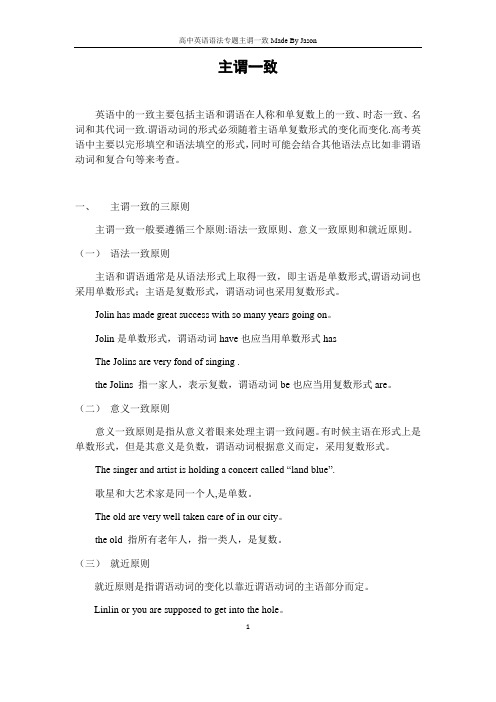
主谓一致英语中的一致主要包括主语和谓语在人称和单复数上的一致、时态一致、名词和其代词一致.谓语动词的形式必须随着主语单复数形式的变化而变化.高考英语中主要以完形填空和语法填空的形式,同时可能会结合其他语法点比如非谓语动词和复合句等来考查。
一、主谓一致的三原则主谓一致一般要遵循三个原则:语法一致原则、意义一致原则和就近原则。
(一)语法一致原则主语和谓语通常是从语法形式上取得一致,即主语是单数形式,谓语动词也采用单数形式;主语是复数形式,谓语动词也采用复数形式。
Jolin has made great success with so many years going on。
Jolin是单数形式,谓语动词have也应当用单数形式hasThe Jolins are very fond of singing .the Jolins 指一家人,表示复数,谓语动词be也应当用复数形式are。
(二)意义一致原则意义一致原则是指从意义着眼来处理主谓一致问题。
有时候主语在形式上是单数形式,但是其意义是负数,谓语动词根据意义而定,采用复数形式。
The singer and artist is holding a concert called “land blue”.歌星和大艺术家是同一个人,是单数。
The old are very well taken care of in our city。
the old 指所有老年人,指一类人,是复数。
(三)就近原则就近原则是指谓语动词的变化以靠近谓语动词的主语部分而定。
Linlin or you are supposed to get into the hole。
1You是最靠近谓语动词的主语部分,因此be动词应当用复数形式的are。
二、主谓一致的详细讲解(一)代词作主语1.不定代词either,neither, each, one,the other,another以及复合不定代词someone,somebody等作主语,谓语动词用单数。
英语主谓一致的三个原则
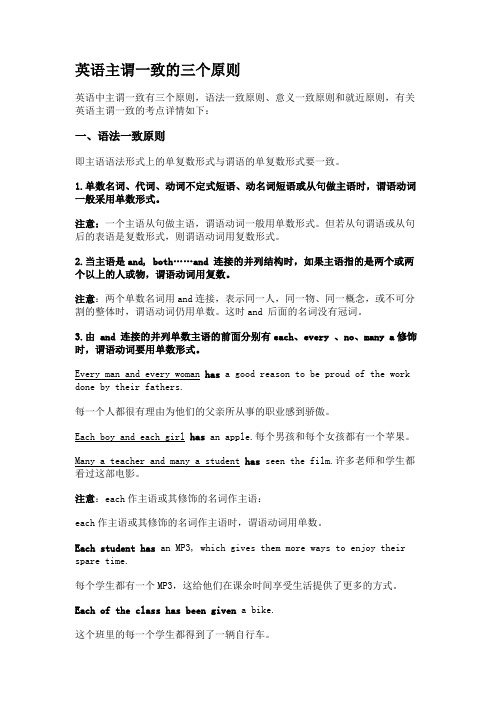
英语主谓一致的三个原则英语中主谓一致有三个原则,语法一致原则、意义一致原则和就近原则,有关英语主谓一致的考点详情如下:一、语法一致原则即主语语法形式上的单复数形式与谓语的单复数形式要一致。
1.单数名词、代词、动词不定式短语、动名词短语或从句做主语时,谓语动词一般采用单数形式。
注意:一个主语从句做主语,谓语动词一般用单数形式。
但若从句谓语或从句后的表语是复数形式,则谓语动词用复数形式。
2.当主语是and, both……and 连接的并列结构时,如果主语指的是两个或两个以上的人或物,谓语动词用复数。
注意:两个单数名词用and连接,表示同一人,同一物、同一概念,或不可分割的整体时,谓语动词仍用单数。
这时and 后面的名词没有冠词。
3.由 and 连接的并列单数主语的前面分别有each、every 、no、many a修饰时,谓语动词要用单数形式。
Every man and every woman has a good reason to be proud of the work done by their fathers.每一个人都很有理由为他们的父亲所从事的职业感到骄傲。
Each boy and each girl has an apple.每个男孩和每个女孩都有一个苹果。
Many a teacher and many a student has seen the film.许多老师和学生都看过这部电影。
注意:each作主语或其修饰的名词作主语:each作主语或其修饰的名词作主语时,谓语动词用单数。
Each student has an MP3, which gives them more ways to enjoy their spare time.每个学生都有一个MP3,这给他们在课余时间享受生活提供了更多的方式。
Each of the class has been given a bike.这个班里的每一个学生都得到了一辆自行车。
主谓一致“三原则”
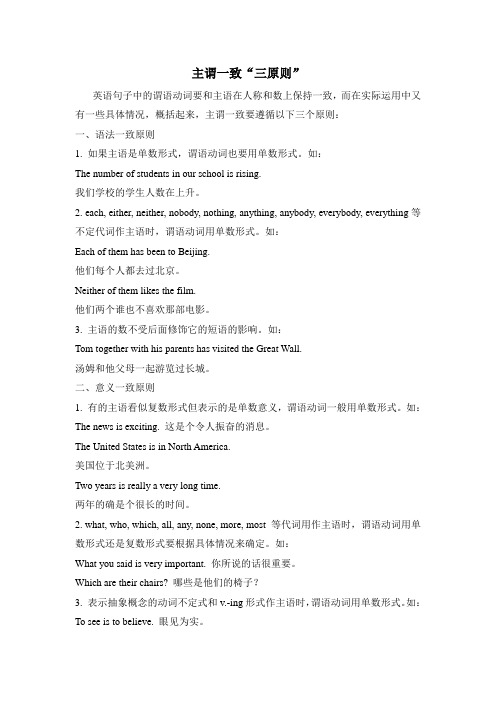
主谓一致“三原则”英语句子中的谓语动词要和主语在人称和数上保持一致,而在实际运用中又有一些具体情况,概括起来,主谓一致要遵循以下三个原则:一、语法一致原则1. 如果主语是单数形式,谓语动词也要用单数形式。
如:The number of students in our school is rising.我们学校的学生人数在上升。
2. each, either, neither, nobody, nothing, anything, anybody, everybody, everything等不定代词作主语时,谓语动词用单数形式。
如:Each of them has been to Beijing.他们每个人都去过北京。
Neither of them likes the film.他们两个谁也不喜欢那部电影。
3. 主语的数不受后面修饰它的短语的影响。
如:Tom together with his parents has visited the Great Wall.汤姆和他父母一起游览过长城。
二、意义一致原则1. 有的主语看似复数形式但表示的是单数意义,谓语动词一般用单数形式。
如:The news is exciting. 这是个令人振奋的消息。
The United States is in North America.美国位于北美洲。
Two years is really a very long time.两年的确是个很长的时间。
2. what, who, which, all, any, none, more, most 等代词用作主语时,谓语动词用单数形式还是复数形式要根据具体情况来确定。
如:What you said is very important. 你所说的话很重要。
Which are their chairs? 哪些是他们的椅子?3. 表示抽象概念的动词不定式和v.-ing形式作主语时,谓语动词用单数形式。
主谓一致的原则

主谓一致的原则主谓一致是英语语法中的基本原则之一,指的是主语和谓语在人称和数上要保持一致。
主谓一致的正确运用能够使句子表达更加准确,符合语言规范。
本文将详细介绍主谓一致的原则,并通过一些例子来加深理解。
一、基本原则在英语句子中,主语和谓语之间必须保持一致,具体包括以下几个方面:1. 人称一致:主语是第一人称(I、we)、第二人称(you)或第三人称(he、she、it、they)时,谓语动词的形式必须与之一致。
例如:- I am a student.(我是一名学生。
)- He sings beautifully.(他唱得很美。
)2. 数一致:主语是单数形式时,谓语动词的形式也要用单数;主语是复数形式时,谓语动词的形式也要用复数。
例如:- The dog barks loudly.(这只狗叫得很大声。
)- The birds are chirping.(鸟儿正在鸣叫。
)3. 特殊情况:有些特殊情况下,主谓一致的原则会有一些变化。
例如:- 不定代词:somebody, anybody, nobody, everybody等当作主语时,谓语动词形式使用第三人称单数形式。
例如:Nobody wants to go with me.(没有人想和我一起去。
)- 连接词:and连接的主语,如果表示同一个人或物时,谓语动词的形式使用第三人称单数形式;如果表示不同的人或物时,谓语动词的形式使用第三人称复数形式。
例如:Tom and Jerry is a famous cartoon.(汤姆和杰瑞是一部著名的卡通片。
)The boys and girls are playing in the park.(男孩和女孩们正在公园里玩耍。
)二、例题分析为了更好地理解主谓一致原则,以下通过一些例题来进行详细分析。
例题1:The team _____ working on the project.(be)在这个例句中,主语是"the team",是单数形式,因此谓语动词的形式应该使用单数,填入be的单数形式"is",句子变为:"The team is working on the project."例题2:He and his friends _____ going to the concert.(be)在这个例句中,主语是"he and his friends",表示多个人,因此谓语动词的形式应该使用复数,填入be的复数形式"are",句子变为:"He and his friends are going to the concert."例题3:One of the students _____ the exam.(fail)在这个例句中,主语是"one of the students",表示多个学生中的一个,因此谓语动词的形式应该使用第三人称单数,填入fail的第三人称单数形式"fails",句子变为:"One of the students fails the exam."三、常见错误在使用主谓一致时,常见的错误包括以下几种:1. 混淆主谓的人称和数:主语与谓语之间的人称和数要保持一致,不可以混淆。
英语语法原则主谓一致三原则

英语语法原则主谓一致三原则主谓一致三原则是指形式一致原则,意义一致原则,临近一致原则,小编在这里整理了相关资料,希望能帮助到您。
1. 形式一致的原则一般说来,当作主语的名词或代词是第三人称单数时,谓语动词就用单数形式;当作主语的名词或代词是复数时,谓语动词就复数形式:如:(1) He likes skating in winter.他喜欢冬天滑冰。
(2) Alice reads much.艾利斯看了很多书。
(3) They don’t live here.他们不住这里。
2. 意义一致的原则英语中,有些名词或代词形式上是单数,而意义上可能是复数,这时,谓语动词的形式就须依据名词或代词的意义决定。
如:(1) People there were very glad to see our team win the match.在那里的人们看到我们队赢了比赛时都非常高兴。
(2) His family were watching TV when I got to his home.我到他家时,他家的人在看电视。
(3) Our class are working hard to make ours a good class.我们班的同学都在努力工作以便是我们班成为优秀班。
3. 邻近一致的原则英语中,有时几个名词或代词有某些此连接起来一起作句子的主语,此时,谓语动词的形式就须有与之最接近的名词或代词的人称和数决定。
如:(1) There is a desk and five chairs in his room.他房间里有一张办公桌和五把椅子。
(2) There are five chairs and a desk in his room.他房间里有五把椅子和一张办公桌。
(3) Either you or Li Lei is going to be sent there.要么是你要么是李蕾将被派到那里去。
(4) Are either you or Li Lei going to be sent there.是你将被派到那里去还是李蕾将被派到那里去?基本句型一:S V (主+谓)主语:可以作主语的成分有名词(如 boy),主格代词(如you),动词不定式,动名词等。
中考英语语法丨主谓一致三原则

中考英语语法丨主谓一致三原则主谓一致三原则的含义:谓语受主语支配,须和主语在人称和数上保持一致,这叫做主谓一致。
主谓一致一般遵循三条原则:语法一致原则,意义一致原则和就近一致原则。
1. 语法一致的原则:(1)以单数名词或代词,动词不定式短语作主语时,谓语动词要用单数;主语为复数时,谓语用复数,例如:He goes to school early every morning.The children are playing outside.To work hard is necessary for a student.(2)由and或both……and连接的并列成分作主语时,谓语动词用复数。
例如:Both he and I are right.Mr Black and Mrs Black have a son called Tom.但并列主语如果指的是同一人,同一事物或同一概念,谓语动词用单数。
例如:His teacher and friend is a beautiful girl.The poet and writer has come.(3)由and连接的并列单数主语之前如果分别由each, every修饰时,其谓语动词要用单数形式。
例如:In our country every boy and every girl has the right to receive education.Each man and each woman is asked to help.(4)主语是单数时,尽管后面跟有but ,except, besides, with 等介词短语,谓语动词仍用单数。
例如:The teacher with his students is going to visit the museum.Nobody but two boys was late for class.Bread and butter is a daily food in the west.(5) 一些只有复数形式的名词,如people, police, cattle, clothes等作主语时,谓语动词要用复数。
- 1、下载文档前请自行甄别文档内容的完整性,平台不提供额外的编辑、内容补充、找答案等附加服务。
- 2、"仅部分预览"的文档,不可在线预览部分如存在完整性等问题,可反馈申请退款(可完整预览的文档不适用该条件!)。
- 3、如文档侵犯您的权益,请联系客服反馈,我们会尽快为您处理(人工客服工作时间:9:00-18:30)。
英语主谓一致的三个原则1. 形式一致的原则一般说来,当作主语的名词或代词是第三人称单数时,谓语动词就用单数形式;当作主语的名词或代词是复数时,谓语动词就复数形式:如:(1)He likes skating in winter. 他喜欢冬天滑冰。
(2)Alice reads much. 艾利斯看了很多书。
(3)They don’t live here. 他们不住这里。
2. 意义一致的原则英语中,有些名词或代词形式上是单数,而意义上可能是复数,这时,谓语动词的形式就须依据名词或代词的意义决定。
如:(1)People there were very glad to see our team win the match. 在那里的人们看到我们队赢了比赛时都非常高兴。
(2)His family were watching TV when I got to his home. 我到他家时,他家的人在看电视。
(3)Our class are working hard to make ours a good class. 我们班的同学都在努力工作以便是我们班成为优秀班。
3. 邻近一致的原则英语中,有时几个名词或代词有某些此连接起来一起作句子的主语,此时,谓语动词的形式就须有与之最接近的名词或代词的人称和数决定。
如:(1)There is a desk and five chairs in his room. 他房间里有一张办公桌和五把椅子。
(2)There are five chairs and a desk in his room. 他房间里有五把椅子和一张办公桌。
(3)Either you or Li Lei is going to be sent there. 要么是你要么是李蕾将被派到那里去。
(4)Are either you or Li Lei going to be sent there.是你将被派到那里去还是李蕾将被派到那里去?几个容易弄错的主谓一致问题1.“many a +名词”和“more than one +名词”作主语谓语动词的数通常用单数(即遵循语法一致的原则):Many a child was playing there. 很多小孩在那儿玩。
More than one student has failed the exam. 不止一个学生考试未及格。
2. each 用于复数名词后作同位语此时谓语动词用复数:They each have an English-Chinese dictionary. 他们每人都有一本英汉词典。
The young people each carry a big bag. 这些年轻人个个背着一个大袋子。
3. 主语后接in addition to, with, along with, together with, except, but等介词其后的动词形式取决介词前主语:Nothing but trees was to be seen. 除了树木之外什么也看不见。
No one except my parents knows anything about this. 除我父母外没人知道此事。
Jim, together with his classmates, has seen the film. 吉姆和他的同学都看过这部电影。
4. means作主语名词means(方法)单数与复数同形,用作主语时,其谓语的单复数要视具体含义而定(尤其注意其前的修饰语):These means are very good. 这些方法很好。
Such a means is really unpleasant. 这样的方法确实是令人不愉快。
若没有特定的修饰语或语境,则用单数或复数谓语均可:There is [are] no good means. 没有好的方法。
Are [Is] there any other means of doing it? 做这事还有其他的什么办法吗?不定代词作主语时的主谓一致问题1. someone, anyone等作主语时someone, anyone, no one, everyone, something, nothing等复合不定代词作主语,谓语动词用单数:Someone is asking to see you. 有人找你。
Nobody is to blame for it. 这谁也不怨。
No one wants to read such books. 没有人想看那样的书。
2. all 作主语时若指人,谓语通常用复数;若指事物或现象,谓语通常用单数:All have gone home. 大家都走了。
All that glitters is not gold. 发亮的不一定都是金子。
比较:All is silent. 万籁俱寂。
(指现象)All are silent. 人人都沉默不语。
(指具体的人)【注意】若是“all of+名词”作主语,则谓语动词与其中名词的数保持一致。
3. either和neither作主语时若是单独作主语,谓语通常用单数:Neither was satisfactory. 两个都不令人满意。
The two guests have arrived, and either is welcome. 两位客人都到了,哪一位都受欢迎。
【注意】若是“either [neither] of+名词”作主语,则其后的谓语动词可用单数(正式文体)或复数(非正式文体):Neither of the two computers is [are] cheap. 这两台电脑都不便宜。
Is [Are] either of the boys ready? 两个男孩都准备好了吗?I don’t think either of them is [are] at home. 我想他们俩个都会不在家。
4. each作主语或修饰主语时单独用作主语(或修饰主语),谓语用单数:Each student has his own desk. 每个学生都有自己的课桌。
Two boys entered. Each was carrying a suitcase. 两个男孩进来,每人提着一只箱子。
【注意】(1)两个或多个“each+单数名词”结构并列作主语时, 谓语用单数。
(2)“each of+复数名词或代词”用作主语, 谓语一般要用单数Each of them was deeply frightened. 他们个个都惊恐万分。
(from www.yygrammar.co m)但是在非正式文体中(尤其是当each of之后的名词较长时)偶尔也可用复数谓语,但很少见,学生宜慎用。
5. none (of) 作主语时若指不可数名词,谓语用单数;若指复数可数名词,谓语可用单数(正式文体)或复数(非正式文体):None of the money is mine. 这笔钱没有一点是我的。
None of the boys like [likes] it. 这些男孩子谁也不喜欢它。
6. 关于“one of+复数名词+定语从句”在这一结构中,定语从句的谓语用复数取决于先行词是one还是其后的复数名词。
一般说来,在这类结构中,复数名词通常被认为是先行词(即定语从句谓语用复数),除非one of 前有the (only) 修饰(此时定语从句的谓语用单数):He is one of the people who were killed in the accident. 他是事故中丧命的人之一。
He is the only one of the people who was killed in the accident. 他是事故中惟一丧命的人。
数量概念作主语时谓语动词的数1. 表时间长度、钱数、速度等的词组作主语此时通常将其视为整体,谓语用单数。
如:Twenty years is a long time. 20年是很长的时间。
Ten dollars is all I have left. 我只剩下10美元。
2. 分数(百分数)作主语“分数(百分数)+of+名词”结构作主语时,谓语动词的数与其中名词的数保持一致。
如:About 30 percent of the pupils were absent that day. 那天大约有30%的学生未到。
Three-fourths of the surface of the earth is covered by sea. 地球表面的四分之三是海。
【注意】在现代英语中,有时即使该结构中的名词为复数,其谓语也可用单数(即将其视为整体):Over sixty per cent of families own [owns] a television. 百分之六十以上的家庭已拥有电视机。
3.“one in [out of]+复数名词”作主语此时谓语动词通常用单数。
如:Only one in ten students has passed the examination. 只有十分之一的学生通过了考试。
One out of twelve bottles was broken. 每12个瓶子中有一个破了。
【注意】在非正式文体中有时也用复数谓语。
如:Nationwide, one in five adults are illiterate. 就全国范围而言,五个成年人中有一个是文盲。
4.“all of (some of, none of, half of, most of, lots of, plenty of)+名词”作主语此时谓语动词的数与其中名词的数保持一致。
如:Most of the people are against the plan. 大多数人反对这个计划。
Most of the Earth’s surface is covered by water. 地球的大部分地区被水覆盖。
Half of the apple is bad. 这个苹果有一半是坏的。
Half of the apples are bad. 这些苹果当中有一半是坏的。
5.“one and a half+复数名词”与“a+单数名词+and a half”作主语此时国内不少书认为,这两个结构作主语,谓语均用单数。
如:One and a half months has passed. / A month and a half has passed. 已经过去了一个半月。
但是,国外一些词书则认为,谓语动词的数取决于这两个结构中名词的数:One and a half months have passed. / A month and a half has passed. 已经过去了一个半月。
